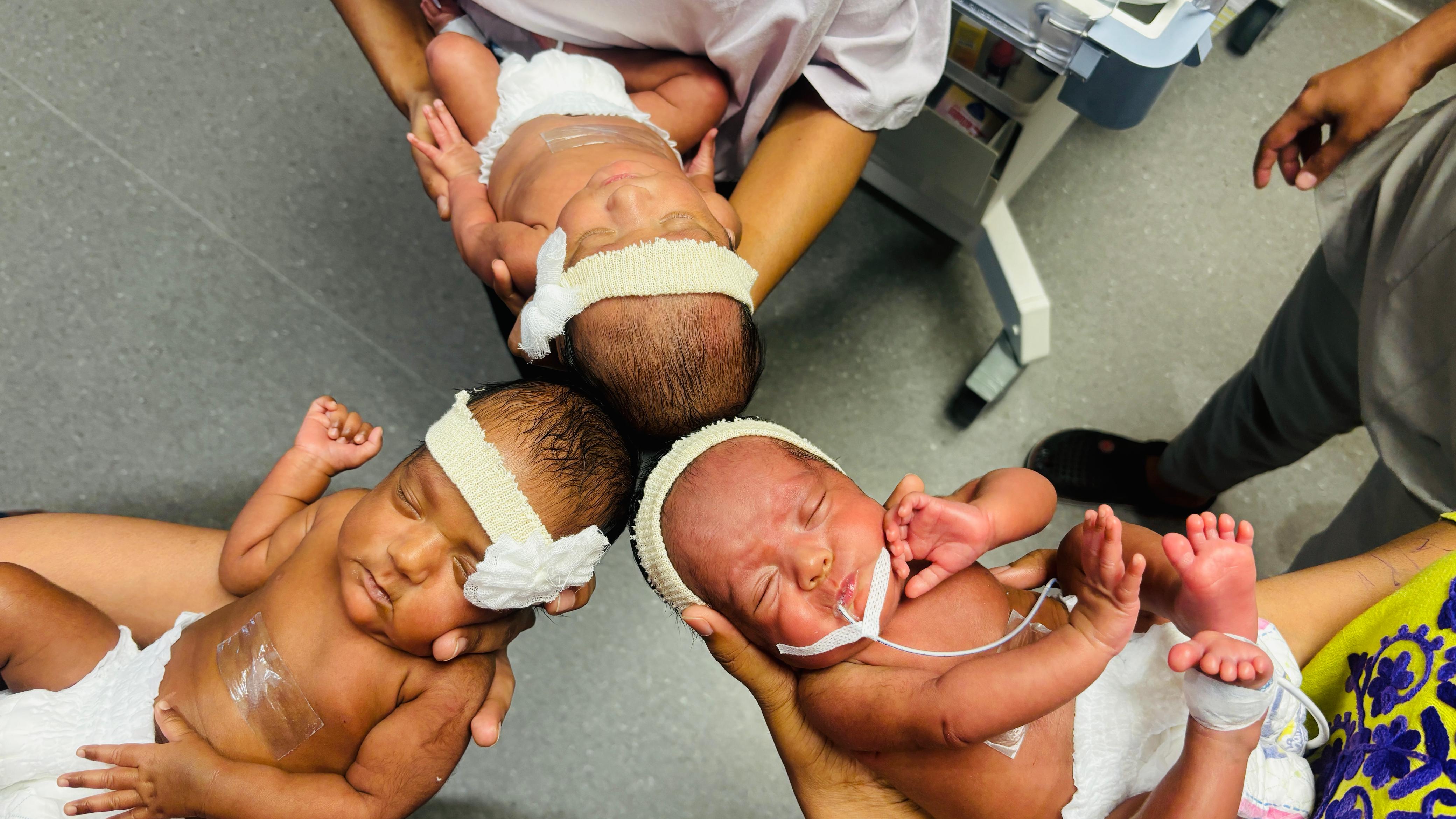- Home
- India
- Medical miracle: How India's first 25-week IVF triplets defied all odds to come home healthy (PHOTOS)
Medical miracle: How India's first 25-week IVF triplets defied all odds to come home healthy (PHOTOS)
A 46-year-old diabetic and hypertensive mother delivers triplets at 25 weeks of gestation via IVF, with all three babies surviving 225 days in NICU without infections or complications. This case, at Amrita Hospital in Faridabad, India, sets a new benchmark for neonatal care in extreme preterm births.
- FB
- TW
- Linkdin
)
IVF Triplets Born at 25 Weeks
In a groundbreaking medical achievement, a 46-year-old Delhi University professor, managing both diabetes and chronic hypertension, has delivered a set of extremely premature triplets, all of whom have survived without complications after spending 225 days in the Neonatal Intensive Care Unit (NICU) at Amrita Hospital, Faridabad.
Born at just 25 weeks of gestation, the trio of girls weighed a combined 2.5 kilograms at birth. Conceived through IVF after years of infertility struggles, the triplets' survival against all odds has set a new benchmark for neonatal outcomes in extreme preterm births.
How Non-Invasive Support and Mother’s Milk Made a Difference
This remarkable case comes as a beacon of hope in a country where prematurity remains a major health challenge, with over 3.5 million babies born prematurely each year. The mother, Jyotsna, a first-time parent and primigravida, faced an exceptionally high-risk pregnancy due to her medical conditions. Despite prolonged infertility, insulin-dependent diabetes, and hypertension, she successfully conceived the triplets, making this pregnancy her final opportunity to become a biological parent.
However, the pregnancy was fraught with complications. As the weeks progressed, Jyotsna developed pneumonia, which required ICU care after an emergency caesarean section delivered the triplets. Yet, despite the severe challenges, the clinical course following the delivery remained unexpectedly stable.
Under the expert guidance of Dr. Hemant Sharma, Senior Neonatologist at Amrita Hospital, a dedicated team of six doctors and nearly 20 NICU nurses ensured round-the-clock care. Remarkably, none of the triplets required mechanical ventilation, a rare occurrence for babies born at such an early stage. One infant received a single dose of surfactant and a blood transfusion, but all three were fed enteral nutrition within hours of birth and achieved full feeds of mother’s milk by the fourth day—well ahead of global standards.
A Team Effort: The Doctors and Nurses Behind the Success
Throughout the 225 days in NICU, the triplets, affectionately referred to as “Tridevi” by the medical team, exhibited zero hospital-acquired infections and no intraventricular hemorrhages. Their survival is a testament to the high-quality care they received and the tireless efforts of the medical staff.
Dr. Hemant Sharma commented, “This was a very complicated case with the mother having diabetes and expecting premature delivery. These were three very small babies, Tridevi, as the team would fondly call them, born far earlier than we would ever hope. But what made the difference was steady, careful care—non-invasive support, timely feeding with mother’s milk, and close observation. We just focused on getting the fundamentals right, every single day, with a team fully committed to their well-being.”
Jyotsna, despite being critically ill herself, remained an active participant in her babies' care. Even while in ICU, she expressed breast milk for her triplets, a crucial factor in their nutritional success and immune defense. The hospital also used donor milk, underscoring the importance of strengthening India's human milk bank system.
Jyotsna’s Journey: A Mother’s Unwavering Commitment to Her Babies
Reflecting on the journey, Jyotsna said, “I am truly grateful to Amrita Hospital. From the moment my daughters were born, I felt they were in safe hands. The doctors and nurses were not just skilled but also very kind. Even when I was unwell, they helped me stay connected to my babies, encouraged me to keep expressing milk, and supported us through every step. I just have gratitude for helping bring all three of them home.”
This case is particularly significant in light of India’s efforts to reduce neonatal mortality through the India Newborn Action Plan and the SDG 3.2 targets. It demonstrates the power of evidence-based, protocol-driven care in overcoming challenges associated with high-risk pregnancies and extreme prematurity. The successful outcome highlights the critical need for advanced neonatal nursing, human milk banking, and a multifaceted healthcare approach to ensure that premature babies not only survive but thrive.
